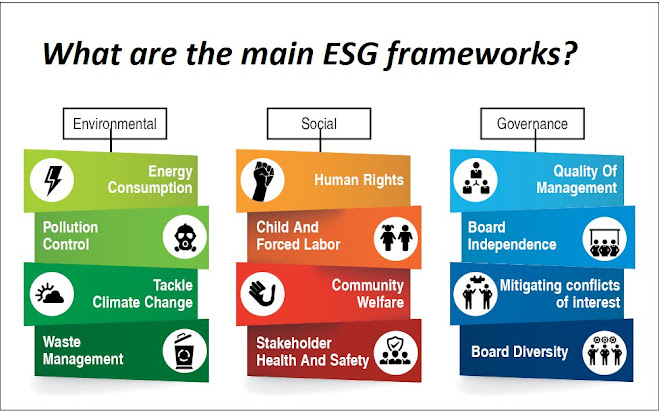What is the ESG framework in India?
The ESG (Environmental, Social, and Governance) framework is a set of guidelines and principles used to evaluate the sustainability and ethical impact of investments in India. It has become an important tool for investors to assess the non-financial risks and opportunities associated with companies, and to make informed decisions about where to allocate their capital.
In India, the ESG framework is largely voluntary, with companies and investors adopting their own approaches to ESG analysis and reporting. However, in recent years, there has been increasing recognition of the importance of ESG factors in investment decision-making, and several industry bodies and regulators have taken steps to promote greater ESG disclosure and transparency.
For example, the Securities and Exchange Board of India (SEBI) has made it mandatory for the top 1,000 listed companies in India to disclose their ESG performance in their annual reports, starting from the financial year 2021-22. This move is expected to increase transparency around ESG issues and help investors make more informed decisions.
In addition, several industry bodies in India, such as the Confederation of Indian Industry (CII) and the Bombay Stock Exchange (BSE), have launched their own ESG initiatives and frameworks to encourage companies to adopt best practices in environmental, social, and governance areas.
Overall, while the ESG framework in India is still evolving, there is a growing recognition of its importance in investment decision-making, and efforts are being made to increase transparency and standardization around ESG reporting and analysis.
ESG Frameworks and ESG Reporting: A Simple Guide
ESG (Environmental, Social, and Governance) frameworks and reporting are important tools used by investors and companies to evaluate the sustainability and ethical impact of investments. Here's a simple guide to help you understand ESG frameworks and reporting:
- What is an ESG framework?
An ESG framework is a set of guidelines and principles used to evaluate the non-financial risks and opportunities associated with companies. These frameworks are used to assess a company's performance in environmental, social, and governance areas, and to identify potential risks and opportunities that may affect the company's long-term financial performance.
- Why is ESG reporting important?
ESG reporting is important because it provides investors with valuable information about a company's environmental, social, and governance performance. This information can help investors make more informed investment decisions and can also help companies identify areas for improvement and demonstrate their commitment to sustainability and ethical practices.
- What are the key elements of an ESG framework?
An ESG framework typically includes a set of criteria or indicators that are used to evaluate a company's performance in environmental, social, and governance areas. Some common indicators include carbon emissions, waste reduction, labor practices, human rights, board diversity, and executive compensation. These indicators may vary depending on the industry and the specific context of the company being evaluated.
- How is ESG reporting done?
ESG reporting is typically done through a sustainability report or a corporate social responsibility (CSR) report. These reports are usually published annually and provide detailed information about a company's environment ESG performance. Some companies also include ESG information in their annual reports or other financial disclosures.
- Who uses ESG frameworks and reporting?
ESG frameworks and reporting are used by a variety of stakeholders, including investors, regulators, customers, and employees. Investors use ESG information to evaluate the sustainability and ethical impact of their investments, while regulators may use ESG information to monitor compliance with environmental and social regulations. Customers and employees may also use ESG information to make purchasing or employment decisions based on a company's sustainability and ethical practices.
In summary, ESG frameworks and reporting are important tools used to evaluate the sustainability and ethical impact of investments. By providing investors with valuable information about a company's environmental, social, and governance performance, ESG reporting can help drive positive change and promote sustainable and ethical practices.
Everything you need to know about ESG framework in India
ESG (Environmental, Social, and Governance) framework in India is gaining prominence as investors and stakeholders become more aware of the importance of responsible ESG investing. Here's everything you need to know about the ESG framework in India:
- What is the ESG framework in India?
The ESG framework in India is a set of guidelines and principles used to evaluate the sustainability and ethical impact of investments in the country. It is used to assess the non-financial risks and opportunities associated with companies and to make informed investment decisions.
- Why is the ESG framework important in India?
The ESG framework is important in India because it helps investors and stakeholders evaluate the environmental, social, and governance performance of companies. This information can help them make informed investment decisions and encourage companies to improve their sustainability and ethical practices.
- What are the key elements of the ESG framework in India?
The ESG framework in India typically includes a set of criteria or indicators used to evaluate a company's performance in environmental, social, and governance areas. These indicators may include carbon emissions, waste reduction, labor practices, human rights, board diversity, executive compensation, and others.
- How is ESG reporting done in India?
ESG reporting in India is done through a sustainability report or a corporate social responsibility (CSR) report. Companies are required to report their ESG performance as part of their annual reports, and the Securities and Exchange Board of India (SEBI) has made it mandatory for the top 1,000 listed companies in India to disclose their ESG performance in their annual reports.
- Who is driving the ESG framework in India?
The ESG framework in India is being driven by several industry bodies and regulators. The SEBI has taken steps to promote greater ESG disclosure and transparency, while industry bodies such as the Confederation of Indian Industry (CII) and the Bombay Stock Exchange (BSE) have launched their own ESG initiatives and frameworks.
- What are the benefits of the ESG framework in India?
The benefits of the ESG framework in India include increased transparency around ESG issues, better risk management, and improved long-term financial performance. Companies that prioritize ESG factors are more likely to attract socially responsible investors and customers, and are better positioned to meet changing regulatory requirements and societal expectations.
In summary, the ESG framework in India is gaining importance as investors and stakeholders become more aware of the importance of responsible investing. By evaluating the environmental, social, and governance performance of companies, the ESG framework can help drive positive change and promote sustainable and ethical practices in India.
Getting the ESG framework right
Getting the ESG Environmental, Social, and Governance framework right is important for investors and companies looking to make responsible and sustainable investments. Here are some key considerations for getting the ESG framework right:
- Define your ESG objectives: Before implementing an ESG framework, it's important to define your objectives and what you hope to achieve. This will help you identify the ESG factors that are most important to your organization and determine how to measure and report on them.
- Conduct a materiality assessment: A materiality assessment can help you identify the ESG factors that are most relevant to your organization and stakeholders. This involves identifying the ESG risks and opportunities that have the potential to impact your business operations and financial performance.
- Develop a comprehensive ESG policy: A comprehensive ESG policy can help guide your organization's ESG strategy and ensure that ESG factors are integrated into your decision-making processes. This policy should include measurable goals and targets for improving your organization's ESG performance, as well as a clear plan for monitoring and reporting on progress.
- Align your ESG strategy with your business strategy: Your ESG strategy should be aligned with your organization's overall business strategy and long-term goals. This can help ensure that your ESG efforts are integrated into your overall business operations and financial performance.
- Invest in ESG data and reporting systems: Robust ESG data and reporting systems are essential for tracking your organization's ESG performance and identifying areas for improvement. This can involve investing in technology, talent, and partnerships with third-party ESG data providers.
- Engage with stakeholders: Engaging with stakeholders, including investors, customers, employees, and communities, can help you understand their expectations and concerns around ESG issues. This can help you identify areas for improvement and build support for your organization's ESG initiatives.




Comments
Post a Comment